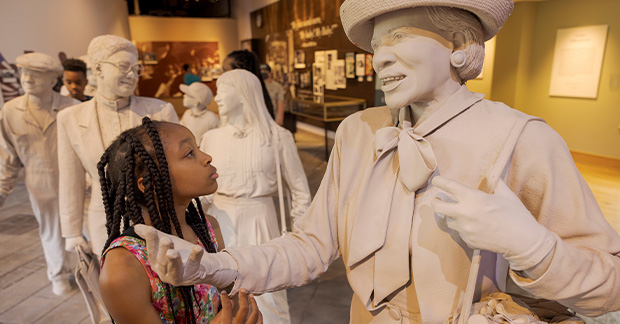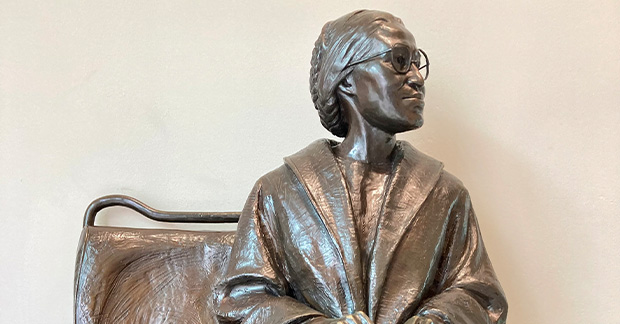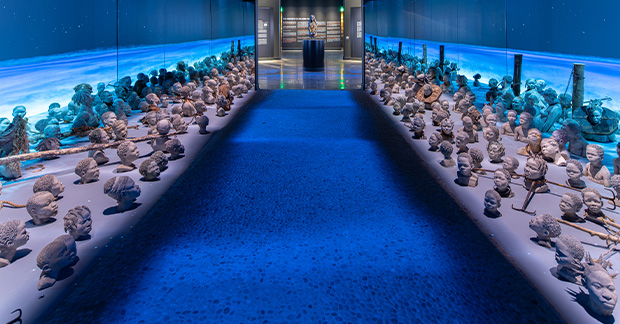With Alabama’s black history sites expected to attract a million visitors this year, Zoey Goto follows the state’s Civil Rights Trail
“We all need to understand civil rights history,” preaches tour leader Wanda Battle, standing before Martin Luther King’s pulpit, her face illuminated by a neon cross radiating down. “If we don’t understand what happened here, it could happen again,” she warns, her voice rising to fill the vaults at Dexter Avenue King Memorial Baptist Church in Montgomery.
Wanda’s message is one that I hear often while travelling Alabama’s Civil Rights Trail, a 300-mile journey from Birmingham and Montgomery to Mobile on the Gulf Coast. In the wake of the Black Lives Matter movement, her sentiment of preventative education is resonating widely, triggering a boom in civil rights tourism.
According to the UN World Tourism Organisation, 40% of international travel now falls under the umbrella of cultural tourism, while in the southern states of the US, around five million visitors a year are engaging with black history sites, according to Alabama Tourism director Lee Sentell.
In Alabama the struggles burnt that little bit brighter – due to the state’s extreme segregation policies and fierce resistance to change
But it’s Alabama’s section of the trail that draws me in, as this expanding network of 30-plus churches, museums and historic sites offers something unique. Because while racial injustice is the thread that weaves throughout the entire US civil rights trail, in Alabama the struggles burnt that little bit brighter – due to the state’s extreme segregation policies and fierce resistance to change.
In recent years, more visitors than ever have come to walk the Alabama streets where history was made in the 1950s and 60s – when activists used non-violent confrontations to demand equality, creating a ripple effect that reached oppressed people globally.
“Ten years ago, there wasn’t much interest, but this year we’re expecting a million pilgrims to visit these sites,” says Lee Sentell, state tourism director for Alabama. “How we travel has changed. People are interested in what’s real, in seeing where history was created.”

A segregated past
My first stop in trying to understand this difficult history is the 16th Street Baptist Church in Birmingham, once known as the most segregated city in America. It was here in 1963 that four young girls were brutally murdered in a KKK bombing that shocked the world.
It’s a harrowing story but one handled with sensitivity by the guides, who lead hourly church tours, which include the John Petts stained glass window, funded by the people of Wales in an expression of their sympathy.
In the basement is the recently added experience room, showing a documentary about the devastating event, as well as the church’s original clock, hauntingly frozen at the exact time the dynamite blasted through the church.
Montgomery
Taking the same roads the freedom riders once travelled in Greyhound buses, I arrive in Montgomery, the city that shaped history as both the cradle of the Confederacy and the birthplace of civil rights.
Montgomery is also home to Alabama’s most-visited black history site, the Legacy Museum, which opened in 2018 and, combined with the neighbouring National Memorial for Peace and Justice, attracts 600,000 visitors annually.

The vast museum harnesses interactive technology, including holograms and videography, to tell the story of structural racism from the slave trade to the present day. It’s a powerful exhibit that requires at least three hours to fully explore.
Nearby, the Freedom Rides Museum and the Rosa Parks Museum create an easy-to-navigate network of sites. Although some visitors may travel Alabama’s trail in its entirety, adding in destinations such as Selma and Scottsboro, most will engage in bite-sized chunks given the trail’s sobering themes – for example, a day spent at Montgomery’s civil rights museums or an afternoon in Mobile added to a coastal trip.
The Clotilda
Alabama’s trail is at various stages of completion. While Birmingham’s Civil Rights Institute has been up and running since the 1990s, at my final stop in the port city of Mobile, history markers are still being hammered into the ground. Mobile entered the international spotlight in 2019 with the discovery of the Clotilda, the last-known slave ship to have entered the US.
With the schooner still submerged and undergoing forensic analysis, all eyes have turned to Africatown, a settlement started by the original enslaved people. Africatown Heritage House is due to open within this community, three miles from downtown Mobile, in early 2023.
Mobile entered the international spotlight in 2019 with the discovery of the Clotilda, the last-known slave ship to have entered the US
The museum will chart the history of the 110 stolen people on the ship, including ceremonial objects from West Africa and 13 pieces of the Clotilda on display. The story of the Clotilda and Africatown reverberates beyond Alabama’s Civil Rights Trail, says Meg Fowler, director of the History Museum of Mobile, which is helping to curate the Clotilda exhibits at Africatown Heritage House.
“We know studying history isn’t just about interpreting the past, it’s also looking to the future,” she says. “And this story is important not only to the future of the South, but also to America as a whole”.

Ask the operator
Cath Pusey, America As You Like It

“The Civil Rights Trail tells a poignant story in US history, relevant to visitors of all ages and backgrounds. Along Alabama’s trail you’ll find world-class museums and attractions, with highlights including the Birmingham Civil Rights Institute and the National Memorial for Peace and Justice.
“We highly recommend downloading the free Alabama Civil Rights Trail app, so that visitors can learn more about key points on the trail while listening to some of the voices of people involved in the movement.”
Book it
America As You Like It offers a seven-night self drive tour from £1,195. The itinerary starts and ends in Atlanta, Georgia, and takes in Montgomery, Selma and Birmingham in Alabama. The price includes return flights, accommodation and car hire.
americaasyoulikeit.com
PICTURES: Equal Justice Initiative/Human Pictures
Read more
Why Texas is one of the best states for a road trip
Elvis tours in Memphis are booming: here’s how to visit Graceland and other music spots in the city
Why Indigenous tourism is so important in Canada




